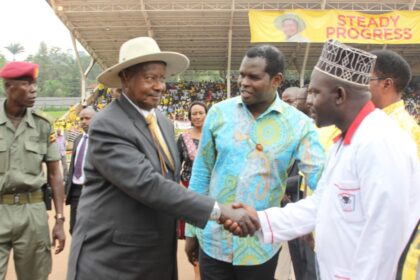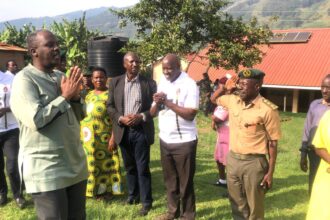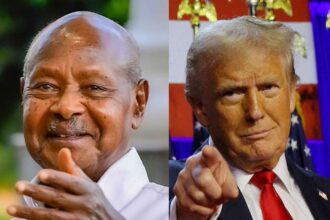Maj Gen. Kasirye Ggwanga’s farm in Mukono, which he baptized Camp David, neighbors my mother’s farm in Kitebe Namaliga village, Nakisunga Sub-county. I grew up knowing his unpredictable character. He knows some of my sisters and village friends too, some of whom have experienced his ill temper.
However, no one I know has ever said they can reign over the retired army general.
Ggwanga would come to his farm, pull out his gun and shoot bullets in the air, beat up farm workers reportedly for misbehaving or stealing his crops, take captive some workers and hold them incommunicado for days!
Ggwanga has always done what he wants to do.
Yours truly, honestly, is uncomfortable in his presence today as it was three decades ago as a small boy.
I can affirm, however, that Gen. Ggwanga might have been a good soldier in war….he could have shot bravely at his enemies, he could retain his honors and bodyguards, but should not hold a gun in times of peace.
Or even in the community.
The good ol’general who believes his gun is his ‘stick’, has misused that weapon for more than 10 times and has got away with it. He also has fans who keep encouraging him as they sing his praises.
One of the most reported misuse of his guns was in 2009.
I was in Makindye, shopping for Christmas goodies around the Magistrates Court.
A market where locals buy different household commodities is in close vicinity to the court.
Also an open ground lies just below the court. Then, like almost every day, people converged to sing praise and worship songs.
That fateful December day, they were actually not many. But I understood they had spent some days there, on a gospel crusade.
I was with my wife and our first born Sheba. She was barely a year old on that particular Christmas Eve.
As I negotiated for a chicken, I heard bullets shot in the air.
I looked up.
A pastor and his choir were running for dear life. The worshipers too were dispersing.
I saw Ggwanga in action.
He kicked plastic chairs where believers were sitting and went on the stage and dismantled microphones.
By the time his anger was over, he ordered the rest of the sound system brought down.
Ggwanga was complaining about noises made by the worshipers, and maybe the action got the support of his neighbors who were denied a beautiful night’s sleep during the crusade days.
But the presence of the court in the vicinity and police not far away in Kibuye Katwe, who would have resolved this dispute, made the mockery of public order. Ggwanga knows his guns can send anyone packing. And he doesn’t shy away from using it whenever he feels like.
Other stories of how he has taken the law into his hands are many.
But I cannot forget the last time I visited him at his Camp David towards the end of last year. That’s when I concluded Ggwanga was a danger even to himself.
It happened that the retired Major General called a colleague asking him to visit him at his farm. I provided the transport and we were on time when he reached the quarter guard of his new camp.
About three acres of land were cleared for him, enclosing about a quarter of an acre with wire-mesh and inside it a tent which has become his home.
Before we were cleared to access him, a soldier at his makeshift quarter-guard asked us if we had an appointment.
We said yes.
He asked us to wait, about 400 meters from the tent, so that he announces our arrival to the general.
We could hear Ggwanga shouting his voice hoarse. Speaking a mixture of English, Luganda and Kiswahili.
“Where are my glasses?” he kept asking.
We waited for about 10 minutes. The guard told us to go closer.
We moved closer.
I was hesitant.
As we stood outside waiting, a gun shot went off.
I got worried.
What had he shot?
From his noises coming from inside the tent, it seemed he was speaking to someone who did not respond to him!

‘Had he killed someone inside?’ I kept asking myself.
Then he emerged from the tent, he swore at us. Not once, not twice.
Those who know Ggwanga also know he swears obscenities. A lot! His brown shirt looked like it needed some sort of contact with water and soap. And he was visibly drunk.
He promised to kill whoever he was speaking to if he doesn’t give him his glasses.
As he staggered to take his seat, a bottle of alcohol in one hand, and a packet of cigarettes in another, I noticed that he did not in any way look his 65 years. Or a gallant general worth his name.
He was an old emancipated man.
“What have you come to do here?” he asked.
We exchanged glances with my colleague.
“You called us here?” we said.
“Who are you?” he asked.
“We are journalists”.
The answer was easy. The General loves attention. And he’s friends with many media people.
“What do you want?” he probed.
By the time he allowed us to sit, he had insulted us several times that we had accepted we were ‘idiots’ countless times. He was having a field day.
We talked for hours, discussing military and political issues in Uganda and beyond. He told us about his idols, dreams and disappointments, now and then shedding a tear, as he sipped on his liquor. Then he would interrupt the conversation with ‘who are you?’ and ‘What do you want from me?’
Ggwanga is hilarious, a good conversationalist and of course, scary.
I would not help thinking about his life as he stretched his leg, revealing a fresh wound on his foot.
“A hyena invaded my camp last night. As I drew my gun, a bullet jumped out and hit me,” he quickly answered our curious gaze.
When we asked him to seek medication, Ggwanga turned against us, once again asking, “Who are you?” What have you come to do here?”
He threatened to throw us out because we were “f****n idiots”.
Well, he forgave us when we brought the subject of his service to Mubende where he served as district chairman.
He actually called himself governor. The subject brings a smile to his face. He told us how he wanted to return to the political trenches of Mubende to ‘show idiots how to govern’. He means governing by using his coercive methods.
He told us how he built roads by using a big stick. He would collect young men from villages on gunpoint, give them an assignment, say, build a bridge, and serve them with meat after. The tactics won him friends, and applause.
However, some people questioned his style of leadership.
As he went on reminisced, he remembered that his lovely dog had been tied on the tree without water.
He then got from his folding, portable seat and ordered me to lift a basin of water. I followed him to a tree on which a huge dog, lay, tied.
However, it was clear the general was fragile and he needed someone to keep him on a right diet and good medical care.
He staggered to the dog, squatted, and unlocked it’s chain. He then whispered an apology of sorts.
“I am so sorry,” he said, “I forgot about you.”
I froze as he released the dog to feed. Meanwhile, I was still waiting for orders to put the water basin down. But before I got any orders, the general could not stand. I watched him for about two minutes before he slipped and fell face first into the bare ground. I watched, basin of water still in my hands and waited for what he would do.
There was no guard in sight and I was now freaking out.
If this man died here – and he wasn’t moving – we would be in trouble,” I thought.
Luckily, he rolled around, somersaulted and then sat. He tried to stand up and failed, again.
He then stretched out his right hand. I put the water basin down and pulled him up.
The look on the General’s face was quite a sight!
As I cleaned dust off his face, he asked me if I had seen him fall. I didn’t know what answer he expected me to give him, but I was honest. I told him I had seen.
He looked sad.
“This is a punishment,” he said.
We walked back to his seat from where he picked his phone and called his driver.
“My children are coming,” he announced. “When the driver comes, he will give you some matooke and you go home.”
Not long after, the children arrived. They know what makes their father happy. They made press ups and kissed his dog. He was on top of the moon, smiling ear to ear. Then ordered the driver to take us to the banana plantation and ‘give’ us ‘food’. We asked the driver if he knew where the general’s glasses were, he said they were in the car. He took them to him. He was very happy.
We bid Ggwanga farewell.
But I left thinking to myself that the retired Major General was not only a threat to the people around him, but also himself. He needs to be managed.
Do you have a story in your community or an opinion to share with us: Email us at Submit an Article





